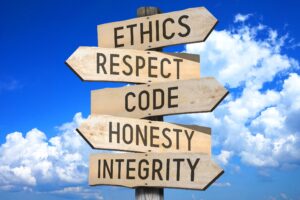 Not only are we in an age of ecosystems, but we are also in an age of growing awareness of corporate social responsibility. With this is a commitment to treating all workers with respect and dignity, ensuring safe working conditions and conducting environmentally responsible, ethical operations. That commitment commonly extends to expectations in the supply chain ecosystem for your suppliers to embrace the same social, environmental and ethical values. Many partner organizations expect their partners to embrace these values AND further to extend these standards to their suppliers and partners.
Not only are we in an age of ecosystems, but we are also in an age of growing awareness of corporate social responsibility. With this is a commitment to treating all workers with respect and dignity, ensuring safe working conditions and conducting environmentally responsible, ethical operations. That commitment commonly extends to expectations in the supply chain ecosystem for your suppliers to embrace the same social, environmental and ethical values. Many partner organizations expect their partners to embrace these values AND further to extend these standards to their suppliers and partners.
Many companies often require their suppliers to adhere to and certify to an expressed, written code of conduct. I had to sign one in taking an engagement with Google for example. In short, the provisions said “Don’t be evil” and “Don’t be rude”.
There are a number of existing Code of Conduct standards, most having evolved from the supplier side of the business but can also be modified for the partner and distribution side. If you are contemplating creating a Code of Conduct for your partner ecosystem, I would recommend starting with what may already be in use with your suppliers.
Code of Conduct Standards
Here are some of the most prominent standards:
- RESPONSIBLE BUSINESS ALLIANCE CODE OF CONDUCT (PREVIOUSLY KNOWN AS THE ELECTRONIC INDUSTRY CITIZENSHIP COALITION)
- UNITED NATIONS GUIDING PRINCIPLES ON BUSINESS AND HUMAN RIGHTS
- UNIVERSAL DECLARATION OF HUMAN RIGHTS
- WEB CONTENT ACCESSIBILITY GUIDELINES (WCAG) 2.0, LEVEL AA
- UNITED STATES FEDERAL ACQUISITION REGULATION (FAR)
Provisions for ethical behavior from these standards consistently appeared in my research of twelve examples of Partner Codes of Conduct. These can serve as a reference point but should be supplemented with terms that specific and relevant to your partner relationships.
Generally, a code of conduct requires partners to comply with generally accepted, ethical business practices. Business partners are expected to shun corrupt business practices such as fraud or bribery, respect intellectual property rights and adhere to fair competition regulations.
Other compliance terms might be specific to a partner or reseller role. These may include truth in advertising when representing your products, services, and relationship.
Insider Trading provisions might also be applicable if you are a public company and partners have access to confidential information regarding product roadmaps or major business opportunities. While insider trading is illegal, as well as corruption, bribery, etc., it’s not a bad idea to reinforce your expectations of ethical behavior in a Code of Conduct.
It can be very helpful to include more subjective behaviors in a Code of Conduct because it gives you a solid platform to manage and enforce them. For example, I recommend that a provision for Professional Business Conduct is included. I have on several occasions been approached by clients who want advice on how to deal with a partner’s employee who has been rude or abusive. You should have some steps to escalate the behavior through the reporting chain but if nothing improves, you may be faced with terminating the relationship. This can prove damaging to the partner’s business and potentially to you, so you want to be on solid ground when you ‘fire’ a partner.
Which leads us to Process and Compliance.
Codification and communication of a Code of Conduct also comes with an expectation that you intend to monitor and enforce compliance. Per the prior example, you need a process for bringing violations to light and dealing with them. Also be very clear about what you expect your partners to do in correcting a violation. Minor infractions require a fix it ticket. Major infractions may require immediate termination.
How strictly you monitor and enforce your code of conduct is highly subjective and dependent upon the risk to your business and your reputation. These can take a number of forms:
Self-certification – partners attest that they will voluntarily comply with the Code. This becomes part of the onboarding process into your ecosystem.
Expectation of Cooperation – partners are expected to cooperate when there is a report of a violation. They help with the fact finding and cooperate in the corrective response, if any.
Subject to Audit – in cases where you might face extreme consequences when a partner goes off the road, you might require partners to agree to an audit. This might actually be a mandatory requirement for some government contracts.
Integrity Training – Not sure how you train someone to have integrity, but I have sat through some ‘compliance’ training for clients. Essentially, it reviewed the Code of Conduct and provided some interactive case studies on ‘what should you do?’ situations.
Remediation – When facing a compliance issue, be very clear on what the ‘fix-it’ path will look like. For example, f it is a misleading ad, then you would expect the partner is expunge it and perhaps issue a correction.
Termination – Repeated bad behavior might justify termination. You should have process for notification and unwinding any business obligations.
Some infractions such as bribery or employing slave labor, just aren’t fixable. The damage is too much. If you have reason to suspect these types of extreme bad behaviors, you need a process of escalating to your legal group who should in turn have a process for reporting to law enforcement.
As a guide for those who might be looking to create their own Code for partners, I’ve included the summary comparison of 12 Partner Code of Conduct documents. There is a link to each in the table header, if you want to dig deeper and actually read the Codes.
I am, of course, happy to discuss if you want to know more or need assistance.
For regular updates on this blog, please sign up for our newsletter.




